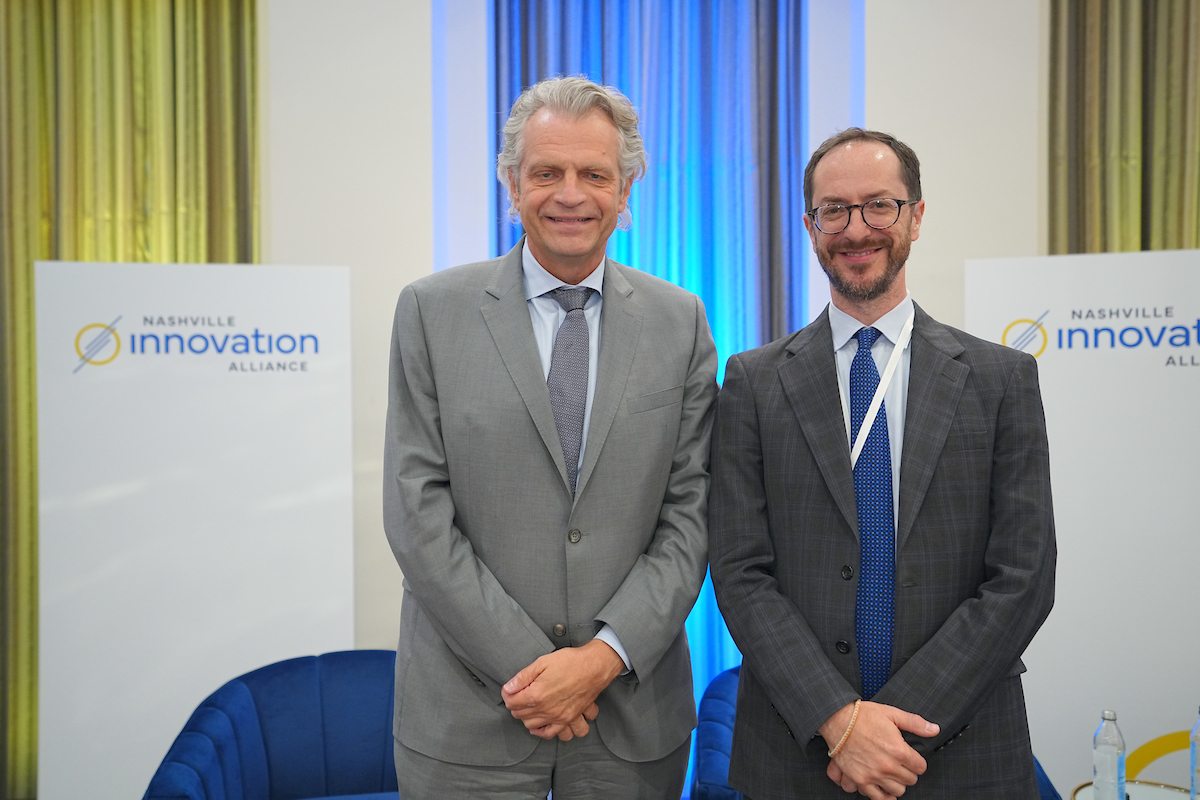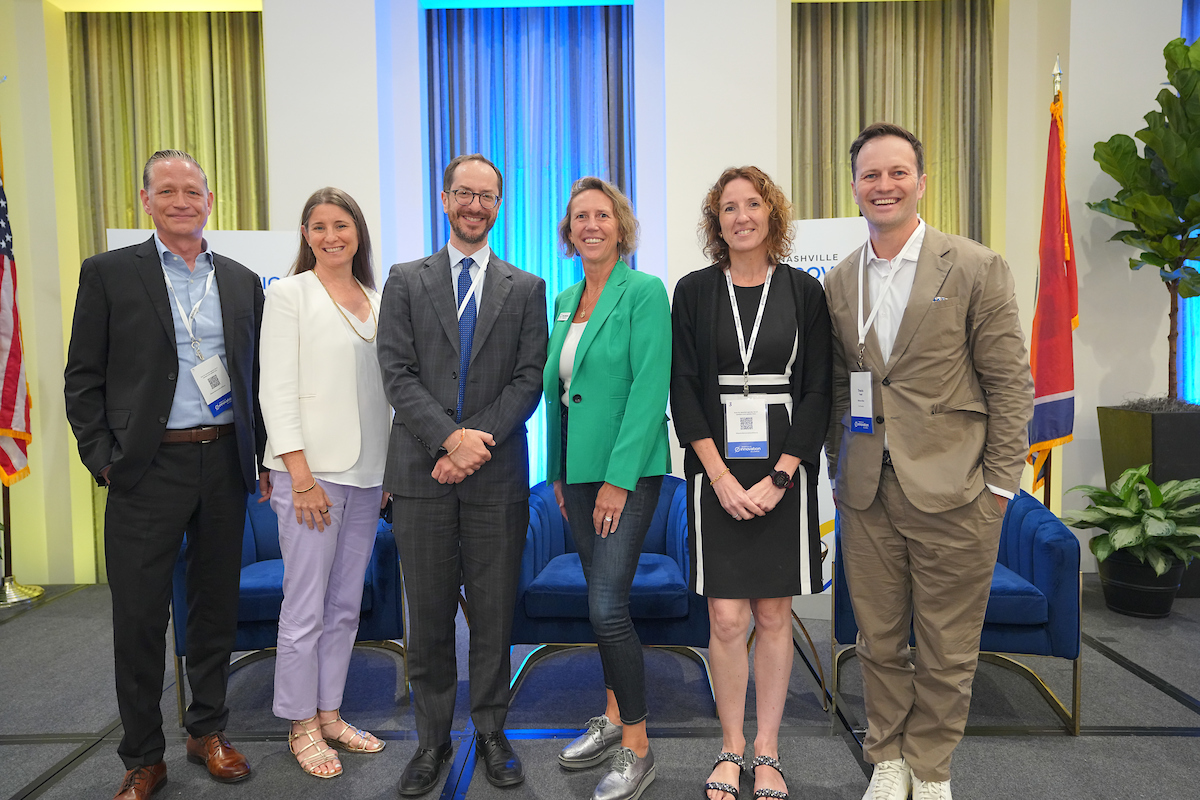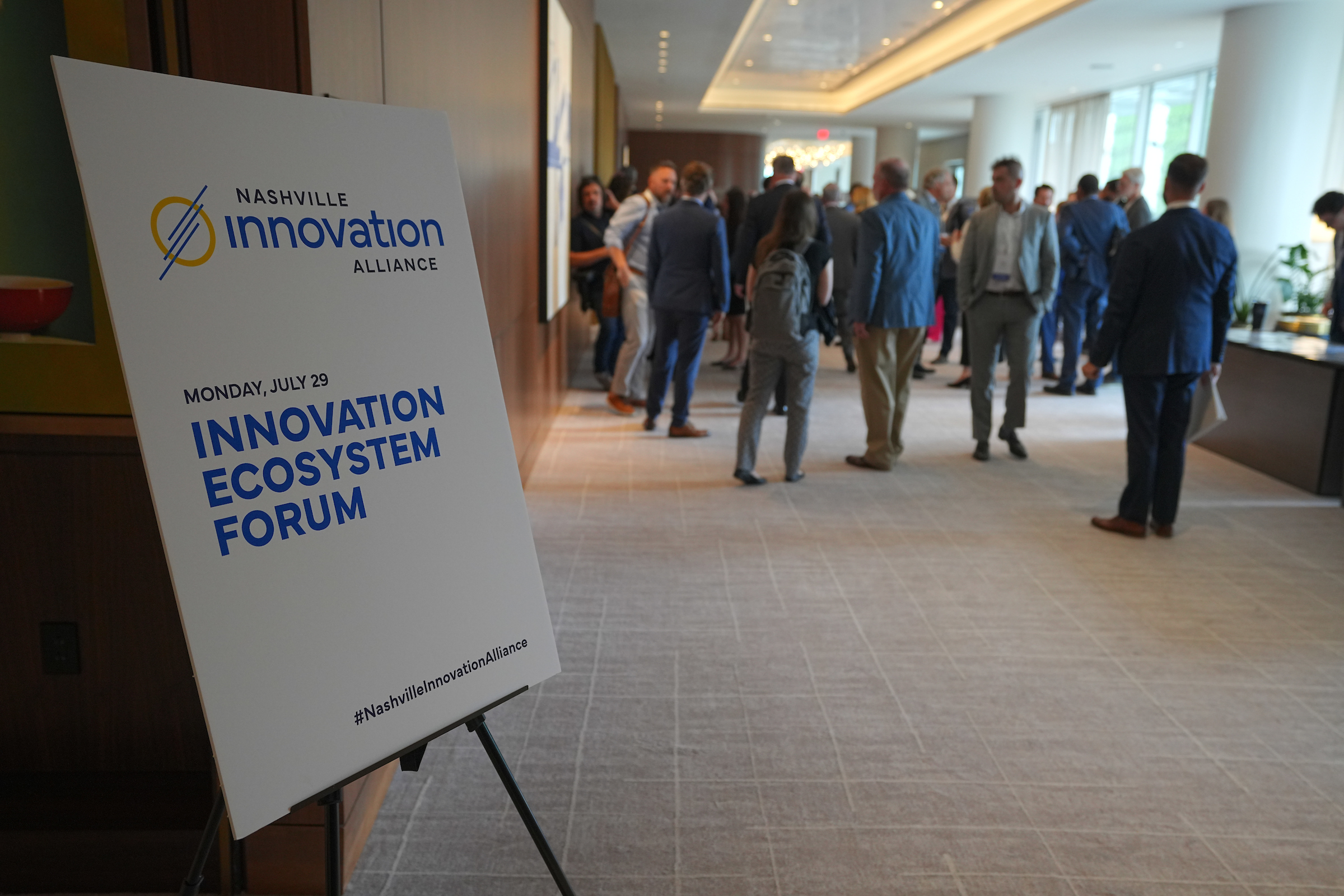“The cities that thrive in this century are those that offer a home and opportunities to researchers, innovators and entrepreneurs. Our next step must be to cultivate our home-grown innovation technology.”
With those words, Vanderbilt University Chancellor Daniel Diermeier set the vision for the Nashville Innovation Alliance Ecosystem Forum, the first of several gatherings bringing together leaders from Nashville’s corporate, civic, community and education institutions and organizations to explore how to make Nashville one of America’s centers of innovation.
Established by Mayor Freddie O’Connell and Chancellor Diermeier, the Nashville Innovation Alliance aims to grow Nashville’s innovation capacity to create economic expansion and inclusive prosperity. The partnership is designed to help Nashville create an environment that fosters innovation and the translation of new technology solutions into commercial applications.

Nashville has the right components to become the next big innovation hub, noted Mayor O’Connell, who participated in the July 29 forum. “We have the nation’s leading research institutions, a deep creative class, some of the top corporate minds in the country, a strong entrepreneurial landscape and, very importantly, a brand. We’re Music City. There’s only one,” O’Connell said. “If we can harness these assets correctly, we can ensure Nashville’s economy remains competitive, not only in traditionally strong sectors, but also in modern, emerging industries. We could be a leader in AI applications, climate change research, automated vehicle technology and much more. We’re not today. We could be tomorrow.”
A blueprint for innovation
At the outset, Chancellor Diermeier outlined three major factors shared by the most dynamic global centers:
- They leverage what is unique about the local lifestyle.
- There is a partnership with elected officials.
- Universities play a key role in fostering the innovation and research and development that create the innovation ecosystem.
Throughout the forum, these themes were a consistent thread that connected the success stories shared by innovation hub leaders from Barcelona, Berlin and New York City.
22@Network, Barcelona’s innovation district, was one such story. In 2000 the city’s mayor made the decision to convert a former factory into a knowledge-based space. A multisector cluster was formed around the media, health and energy sectors. For each area, one company, one university and one institution with expertise in those fields were brought in. The initiative and collaboration paid off, noted Isabel Sabadi, managing director of 22@Network. Today, 22@Network has the second-highest GDP of all the districts in Barcelona, with 12,150 companies, 16 universities and business schools, and 50 sustainable buildings that make up its clusters.
Travis Todd, co-founder of Berlin’s leading startup community Silicon Allee, also pointed to collaboration as a key driver of their hub’s success. Government and academia should work together to remove barriers to innovation, he said. But most importantly, Berlin’s “secret sauce” was its brand—quality of life, community and culture, and diversity led to the city’s success and helped it recruit talent and companies. “My advice for Nashville is to leverage your creative history, focus on livability, remove barriers, foster collaboration, and inclusion and diversity,” Todd said. “Celebrate your culture, promote it, and leverage that as your selling point to bring people.”
Vanderbilt alumna Julie Samuels, JD’05, is seeing similar growth in New York City. The city has one of the biggest technology ecosystems in the country—second only to Silicon Valley. As the president and CEO of Tech:NYC, she plays a role in that growth, helping build relationships between the technology industry, government and media to break down barriers and enact policies that fuel it. “Universities and government buy-in are important, but unless the energy comes from the private sector, it will not succeed,” Samuels said. “You need the people who are building and running the companies to take their time and energy to commit to building the vibrant ecosystem you want to see in Nashville.”
She feels optimistic about Nashville’s future as an innovation ecosystem. Samuels cited the city’s quality of life, an engaged leadership that’s willing to work on issues, and the post-pandemic mobility of the tech industry as reasons for future success.

One of the issues at the heart of creating an innovation hub is a city’s livability, and mobility is a key factor. Florian Lennert, co-founder of Disrupting Mobility and a senior fellow at the Helmholtz Research Institute for Sustainability in Berlin, highlighted the success of reinventing cities by taking advantage of current technologies to pilot new forms of sustainable and smart cities. Berlin found an area—in this case, an abandoned airport—and brought together a university, offices, startups, manufacturing facilities and 10,000 residential units of affordable housing to launch the vision of this efficient mobility neighborhood. Here they tested ideas—such as inductive charging for buses and smaller charging ports for electric cars—for an efficient mobility neighborhood. “Find the district, find a place where you can try this out. That will attract people’s attention,” Lennert said. “This is a huge opportunity. Nashville has an incredible global brand around music, health, defense and automotive. Use those things to tell Nashville’s story.”
The path forward
The representatives of all three of the cities at the forum mentioned the vital importance of collaborative efforts to create the right environment for innovation to flourish, including regulatory, legislative, cultural and economic conditions.
“A university-city partnership is critical to an innovation economy,” said Richard Florida, an internationally renowned urbanist and visiting professor at Vanderbilt University who helped conclude the forum. “It’s the key. When that happens and growth weighs in, it happens.”
The link to academia was noted as a crucial ingredient in the development of these innovation hubs. But the representatives of all three cities also agreed that the technology industry needed an advocate with government—not just to make sure that the city was benefiting tech, but also that tech was benefiting the city.
The Nashville Innovation Alliance steering committee is made up of these crucial elements. The members are:
- Freddie O’Connell, Mayor, Metropolitan Government of Nashville and Davidson County
- Daniel Diermeier, Chancellor, Vanderbilt University
- Isaac Addae, Manager of Entrepreneurship and Economic Development, Nashville Mayor’s Office
- Elise Cambournac, President and CEO, Greater Nashville Technology Council
- Lindsey Cox, CEO, LaunchTN
- Sam Davidson, CEO, Nashville Entrepreneur Center
- Padma Raghavan, Vice Provost for Research and Innovation, Vanderbilt University
In terms of next steps, Mayor O’Connell pointed to livability as a critical factor. “The ability to see yourself as a part of Nashville’s growth and city building is important—we have our biggest opportunity in urban innovation.”
Chancellor Diermeier pinpointed factors contributing to the success of innovation ecosystems in London, Barcelona, Berlin and Tel Aviv, including collaboration with a university, cultivation of a lifestyle destination and implementation of a top-down government model. He noted the importance of catalyzing those components as crucial next steps for Nashville.
“We just have to roll up our sleeves and do it. What we need is a sense of urgency,” Diermeier said.
With a university anchor and a collaborative spirit, the Nashville Innovation Alliance can explore next steps with the lessons learned from the forum and feedback from the audience and others.
“There need to be solutions for transportation and housing. It needs to be in tune with the character of the place and not be afraid to be different,” Diermeier said. “How do we think about mobility? What is the future of the neighborhood? There is real possibility for us to be bold and innovative.”
